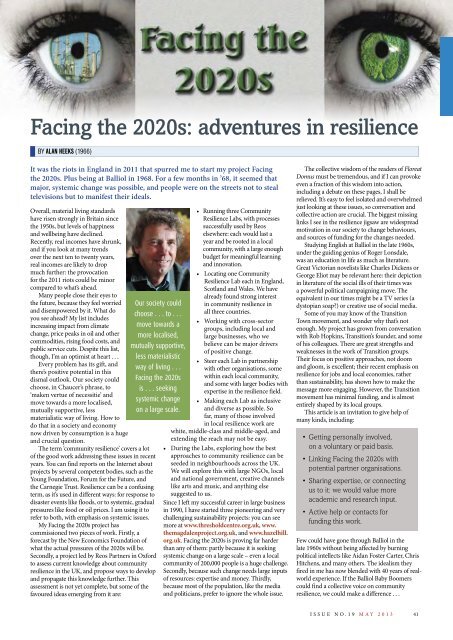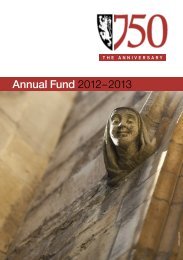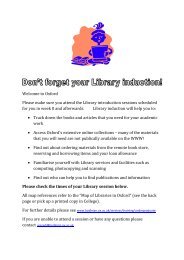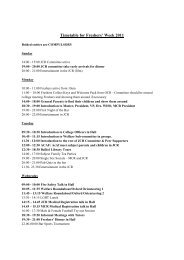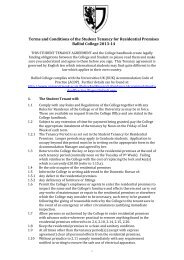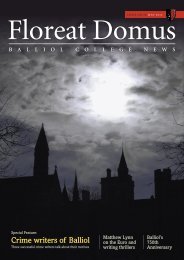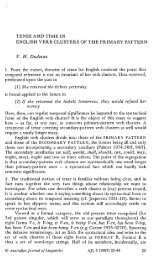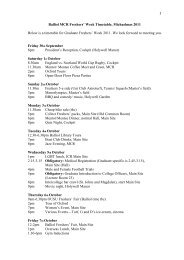Issue 19, 2013 - Balliol College - University of Oxford
Issue 19, 2013 - Balliol College - University of Oxford
Issue 19, 2013 - Balliol College - University of Oxford
You also want an ePaper? Increase the reach of your titles
YUMPU automatically turns print PDFs into web optimized ePapers that Google loves.
Facing the 2020s: adventures in resilience<br />
By AlAn heeks (<strong>19</strong>66)<br />
It was the riots in England in 2011 that spurred me to start my project Facing<br />
the 2020s. Plus being at <strong>Balliol</strong> in <strong>19</strong>68. For a few months in ’68, it seemed that<br />
major, systemic change was possible, and people were on the streets not to steal<br />
televisions but to manifest their ideals.<br />
overall, material living standards<br />
have risen strongly in Britain since<br />
the <strong>19</strong>50s, but levels <strong>of</strong> happiness<br />
and wellbeing have declined.<br />
Recently, real incomes have shrunk,<br />
and if you look at many trends<br />
over the next ten to twenty years,<br />
real incomes are likely to drop<br />
much further: the provocation<br />
for the 2011 riots could be minor<br />
compared to what’s ahead.<br />
Many people close their eyes to<br />
the future, because they feel worried<br />
and disempowered by it. What do<br />
you see ahead My list includes<br />
increasing impact from climate<br />
change, price peaks in oil and other<br />
commodities, rising food costs, and<br />
public service cuts. Despite this list,<br />
though, i’m an optimist at heart . . .<br />
every problem has its gift, and<br />
there’s positive potential in this<br />
dismal outlook. our society could<br />
choose, in Chaucer’s phrase, to<br />
‘maken vertue <strong>of</strong> necessitie’ and<br />
move towards a more localised,<br />
mutually supportive, less<br />
materialistic way <strong>of</strong> living. How to<br />
do that in a society and economy<br />
now driven by consumption is a huge<br />
and crucial question.<br />
the term ‘community resilience’ covers a lot<br />
<strong>of</strong> the good work addressing these issues in recent<br />
years. You can find reports on the internet about<br />
projects by several competent bodies, such as the<br />
Young Foundation, Forum for the Future, and<br />
the Carnegie trust. Resilience can be a confusing<br />
term, as it’s used in different ways: for response to<br />
disaster events like floods, or to systemic, gradual<br />
pressures like food or oil prices. i am using it to<br />
refer to both, with emphasis on systemic issues.<br />
My Facing the 2020s project has<br />
commissioned two pieces <strong>of</strong> work. Firstly, a<br />
forecast by the new economics Foundation <strong>of</strong><br />
what the actual pressures <strong>of</strong> the 2020s will be.<br />
secondly, a project led by Reos Partners in oxford<br />
to assess current knowledge about community<br />
resilience in the uK, and propose ways to develop<br />
and propagate this knowledge further. this<br />
assessment is not yet complete, but some <strong>of</strong> the<br />
favoured ideas emerging from it are:<br />
Our society could<br />
choose . . . to . . .<br />
move towards a<br />
more localised,<br />
mutually supportive,<br />
less materialistic<br />
way <strong>of</strong> living . . .<br />
Facing the 2020s<br />
is . . . seeking<br />
systemic change<br />
on a large scale.<br />
• Running three Community<br />
Resilience Labs, with processes<br />
successfully used by Reos<br />
elsewhere: each would last a<br />
year and be rooted in a local<br />
community, with a large enough<br />
budget for meaningful learning<br />
and innovation.<br />
• Locating one Community<br />
Resilience Lab each in england,<br />
scotland and Wales. We have<br />
already found strong interest<br />
in community resilience in<br />
all three countries.<br />
• Working with cross-sector<br />
groups, including local and<br />
large businesses, who we<br />
believe can be major drivers<br />
<strong>of</strong> positive change.<br />
• steer each Lab in partnership<br />
with other organisations, some<br />
within each local community,<br />
and some with larger bodies with<br />
expertise in the resilience field.<br />
• Making each Lab as inclusive<br />
and diverse as possible. so<br />
far, many <strong>of</strong> those involved<br />
in local resilience work are<br />
white, middle-class and middle-aged, and<br />
extending the reach may not be easy.<br />
• During the Labs, exploring how the best<br />
approaches to community resilience can be<br />
seeded in neighbourhoods across the uK.<br />
We will explore this with large nGos, local<br />
and national government, creative channels<br />
like arts and music, and anything else<br />
suggested to us.<br />
since i left my successful career in large business<br />
in <strong>19</strong>90, i have started three pioneering and very<br />
challenging sustainability projects: you can see<br />
more at www.thresholdcentre.org.uk, www.<br />
themagdalenproject.org.uk, and www.hazelhill.<br />
org.uk. Facing the 2020s is proving far harder<br />
than any <strong>of</strong> them: partly because it is seeking<br />
systemic change on a large scale – even a local<br />
community <strong>of</strong> 200,000 people is a huge challenge.<br />
secondly, because such change needs large inputs<br />
<strong>of</strong> resources: expertise and money. thirdly,<br />
because most <strong>of</strong> the population, like the media<br />
and politicians, prefer to ignore the whole issue.<br />
the collective wisdom <strong>of</strong> the readers <strong>of</strong> Floreat<br />
Domus must be tremendous, and if i can provoke<br />
even a fraction <strong>of</strong> this wisdom into action,<br />
including a debate on these pages, i shall be<br />
relieved. it’s easy to feel isolated and overwhelmed<br />
just looking at these issues, so conversation and<br />
collective action are crucial. the biggest missing<br />
links i see in the resilience jigsaw are widespread<br />
motivation in our society to change behaviours,<br />
and sources <strong>of</strong> funding for the changes needed.<br />
studying english at <strong>Balliol</strong> in the late <strong>19</strong>60s,<br />
under the guiding genius <strong>of</strong> Roger Lonsdale,<br />
was an education in life as much as literature.<br />
Great Victorian novelists like Charles Dickens or<br />
George eliot may be relevant here: their depiction<br />
in literature <strong>of</strong> the social ills <strong>of</strong> their times was<br />
a powerful political campaigning move. the<br />
equivalent in our times might be a tV series (a<br />
dystopian soap) or creative use <strong>of</strong> social media.<br />
some <strong>of</strong> you may know <strong>of</strong> the transition<br />
town movement, and wonder why that’s not<br />
enough. My project has grown from conversation<br />
with Rob Hopkins, transition’s founder, and some<br />
<strong>of</strong> his colleagues. there are great strengths and<br />
weaknesses in the work <strong>of</strong> transition groups.<br />
their focus on positive approaches, not doom<br />
and gloom, is excellent; their recent emphasis on<br />
resilience for jobs and local economies, rather<br />
than sustainability, has shown how to make the<br />
message more engaging. However, the transition<br />
movement has minimal funding, and is almost<br />
entirely shaped by its local groups.<br />
this article is an invitation to give help <strong>of</strong><br />
many kinds, including:<br />
• Getting personally involved,<br />
on a voluntary or paid basis.<br />
• Linking Facing the 2020s with<br />
potential partner organisations.<br />
• Sharing expertise, or connecting<br />
us to it: we would value more<br />
academic and research input.<br />
• Active help or contacts for<br />
funding this work.<br />
Few could have gone through <strong>Balliol</strong> in the<br />
late <strong>19</strong>60s without being affected by burning<br />
political intellects like Aidan Foster Carter, Chris<br />
Hitchens, and many others. the idealism they<br />
fired in me has now blended with 40 years <strong>of</strong> realworld<br />
experience. if the <strong>Balliol</strong> Baby Boomers<br />
could find a collective voice on community<br />
resilience, we could make a difference . . .<br />
issue no.<strong>19</strong> MAY <strong>2013</strong><br />
41


